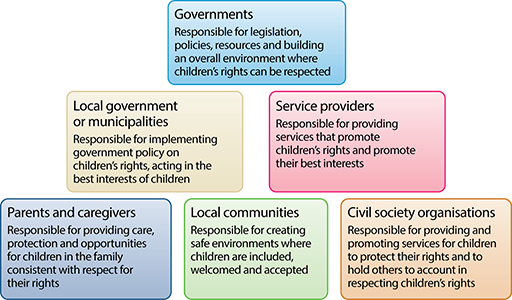1.6 Duties and responsibilities
One of the key aspects of a person having a right is that there is a corresponding responsibility on someone else to ensure that the right is fulfilled or respected. Children’s youth, vulnerability and lack of power mean that they are dependent on adults to ensure that their needs and rights are met. This places responsibility on adults to create the necessary conditions to ensure this happens.
The UN Convention describes governments as the primary duty bearers. This means governments, more than any other institution or organisation, have both the duty and the responsibility of fulfilling the rights of children. These responsibilities include the fulfilment of rights for individual children; for example, access to health care and education. They also include the development of public policies that positively influence children’s health and development; for example, adequate housing, safe transport, protection of the environment, a healthy economy and the elimination of poverty.
Many other groups also have responsibilities, including local authorities, health service providers, communities, parents and other caregivers. The UN Convention provides some guidance on the different responsibilities of governments and families in ensuring children’s rights are realised. For example, it emphasises that governments must respect the role of parents or caregivers as having primary responsibility for the guidance, upbringing and development of the child.
However, the UN Convention also stresses that the best interests of the child will be the basic concern. In other words, parents and caregivers must always take into account the child’s best interests in all decisions and actions that affect the child. And this means ensuring that their rights are respected. This includes, for example, ensuring that both boys and girls are provided with equal shares of food within the family, or not disciplining children using physical violence. A parent’s role is to promote the full, healthy development of their children, taking into account their age, abilities and evolving capacities. Parents should ensure that the child’s physical, psychological, social and spiritual needs and rights are met.
A brief overview of responsibilities of key duty bearers are outlined in Figure 1.1 below.

An old African proverb (Kiswahili) – It takes a village to raise a child
In relation to health, for example:
- The government has a responsibility to ensure that sufficient resources are allocated for health care services, training of doctors and nurses, and ensuring that services are available for all children, wherever they live in the country.
- A hospital or clinic has a responsibility to provide a professional, efficient and inclusive health service for all children who need information, advice and treatment regarding their health.
- Health workers have a responsibility to treat all children with respect, without discrimination, and to ensure that the children are as fully involved in their own health care as possible.
- The family or caregiver has a responsibility to provide, as far as possible, a healthy environment for the child to grow up in, with sufficient food, care and shelter, and to ensure s/he gets access to health care whenever needed.
Children also have responsibilities:
- To themselves – to do whatever they can to ensure their own safety, health and learning.
- To other children – to be caring, responsive and protective of other children and not act in ways that prevent their rights being realised; for example, bullying, or disruptive behaviour in school.
- To their families – to contribute to the life of the family, support their parents and show appropriate respect for elders.
- To their community – to contribute positively and as far as possible towards community life and their own environment.
However, it is important to remember that rights are ‘inalienable’ – this means that they cannot be taken away. Rights are not dependent on children exercising responsibility. For example, children cannot be denied the right to health care because they have acted in ways that place their health at risk.
1.5 The interconnected and indivisible nature of rights
